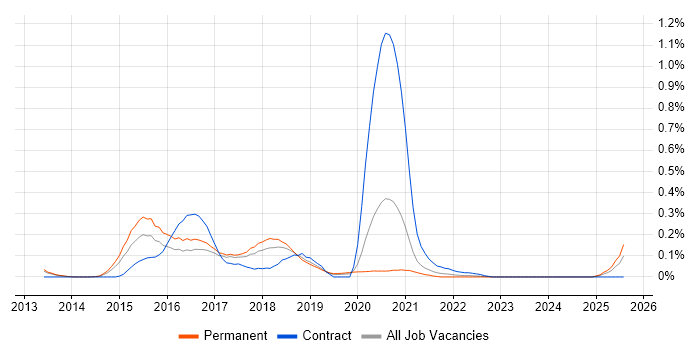Hadoop Distributed File System (HDFS)
North West > Manchester
The table below provides summary statistics and salary benchmarking for jobs advertised in Manchester requiring HDFS skills. It covers vacancies from the 6 months leading up to 15 September 2025, with comparisons to the same periods in the previous two years.
| 6 months to 15 Sep 2025 |
Same period 2024 | Same period 2023 | |
|---|---|---|---|
| Rank | 154 | - | - |
| Rank change year-on-year | - | - | - |
| Permanent jobs citing HDFS | 1 | 0 | 0 |
| As % of all permanent jobs advertised in Manchester | 0.042% | - | - |
| As % of the System Software category | 0.33% | - | - |
| Number of salaries quoted | 1 | 0 | 0 |
| 10th Percentile | - | - | - |
| 25th Percentile | £82,500 | - | - |
| Median annual salary (50th Percentile) | £85,000 | - | - |
| 75th Percentile | £87,500 | - | - |
| 90th Percentile | - | - | - |
| North West median annual salary | £85,000 | - | - |
All System Software Skills
Manchester
HDFS falls under the System Software category. For comparison with the information above, the following table provides summary statistics for all permanent job vacancies requiring system software skills in Manchester.
| Permanent vacancies with a requirement for system software skills | 305 | 279 | 529 |
| As % of all permanent jobs advertised in Manchester | 12.93% | 6.91% | 18.55% |
| Number of salaries quoted | 172 | 161 | 449 |
| 10th Percentile | £31,500 | £27,500 | £31,000 |
| 25th Percentile | £35,500 | £31,250 | £43,750 |
| Median annual salary (50th Percentile) | £57,500 | £45,000 | £60,000 |
| Median % change year-on-year | +27.78% | -25.00% | +20.00% |
| 75th Percentile | £69,063 | £65,000 | £75,000 |
| 90th Percentile | £82,500 | £75,000 | £80,000 |
| North West median annual salary | £53,750 | £43,742 | £55,000 |
| % change year-on-year | +22.88% | -20.47% | +19.57% |
HDFS
Job Vacancy Trend in Manchester
Job postings citing HDFS as a proportion of all IT jobs advertised in Manchester.

HDFS
Salary Trend in Manchester
Salary distribution trend for jobs in Manchester citing HDFS.

HDFS
Co-occurring Skills and Capabilities in Manchester by Category
The follow tables expand on the table above by listing co-occurrences grouped by category. The same employment type, locality and period is covered with up to 20 co-occurrences shown in each of the following categories:
